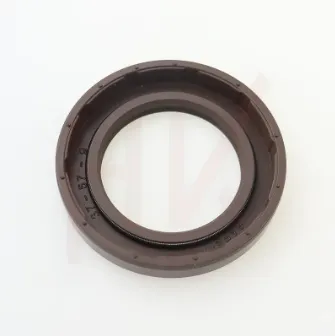अप्रिल . 08, 2025 09:10 सूचीमा फर्कनुहोस्
A Comprehensive Guide to Oil Seals and Their Applications
Oil seals are essential components used to prevent leakage of oil or other lubricants from mechanical systems. There are different types of oil seals, each designed to meet specific requirements based on the application, operating conditions, and the type of machinery in use. Some of the most common types of oil seals include:
-
Radial lip seals: These are the most widely used seals, designed to prevent leakage of oil or grease under pressure.
-
Axial seals: These seals are used to prevent contamination or leakage in systems that operate at low pressure.
-
Floating seals: Primarily used in situations where fluid is in constant motion, such as in hydraulic pumps or machinery.
-
V-rings: These are used as additional protection to prevent dirt and moisture from entering machinery.
Choosing the correct type of oil seal depends on the equipment and its specific needs. Each type has its benefits, and selecting the right one is key to maximizing efficiency and minimizing downtime.

Installing Oil Seals: A Step-by-Step Guide
Installing oil seals correctly is crucial to ensuring their effectiveness and longevity. Improper installation can lead to seal failure, resulting in oil leakage, contamination, and costly repairs. Here’s a simple step-by-step guide for installing oil seals:
-
Preparation: Before starting, ensure the sealing surface is clean and free from debris. Clean both the sealing area and the sealing lip to prevent contamination.
-
Check the size: Verify that the oil sealsize is appropriate for the application. Using the wrong size seal can cause improper sealing, leading to leaks.
-
Lubrication: Lightly lubricate the sealing lip with the lubricant the system uses to ensure smooth installation.
-
Align the seal: Align the oil sealwith the sealing surface and gently tap it into place with a mallet or seal installation tool.
-
Inspection: After installation, inspect the seal to ensure it is seated properly and there are no gaps. Run the machinery to check for any signs of leakage.
Proper installation of oil seals can greatly extend the lifespan of your equipment and prevent costly maintenance issues.
Why Opt for Custom Made Oil Seals?
Sometimes, off-the-shelf oil seals do not meet the specific needs of certain applications. In such cases, custom made oil seals are the solution. These seals are specially designed and manufactured to match unique equipment requirements, such as specific dimensions, materials, or operating conditions. The benefits of custom made oil seals include:
-
Perfect fit: They are designed to fit the exact specifications of your machinery, ensuring optimal sealing performance.
-
Material selection: Custom seals can be made from materials that offer resistance to high temperatures, chemicals, or extreme pressures.
-
Increased efficiency: A custom seal helps reduce wear and tear, preventing leaks and minimizing downtime.
-
Cost-effectiveness: While custom seals may have a higher upfront cost, they can save money in the long run by improving the efficiency and longevity of your machinery.
When standard seals just won’t cut it, custom made oil seals offer a tailored solution that ensures your equipment functions smoothly.
Understanding the Role of Pump Seal Oil
The pump seal oil is an integral part of any pump system, as it helps to prevent leaks and protect the pump’s internal components from wear. The role of pump seal oil is to provide lubrication, reduce friction, and create a tight seal between rotating parts and the outer housing. The proper use of pump seal oil ensures that the pump operates efficiently and that the seals maintain their integrity for longer periods. Regular monitoring and replacement of pump seal oil can help to maintain optimal pump performance and reduce the risk of costly repairs.
Wheel Seal Oil: Essential for Vehicle and Machinery Performance
In automotive and heavy machinery applications, wheel seal oil plays a crucial role in maintaining the function and longevity of wheel assemblies. Wheel seal oil is designed to protect the bearings and other internal components of the wheel from contaminants, water, and excess heat. It ensures that the wheel assembly operates smoothly and efficiently, reducing friction and preventing premature wear. Proper maintenance of wheel seal oil is essential for vehicles, trucks, and machinery that operate in tough environments.
When the wheel seal oil is not properly maintained or replaced, it can lead to wheel bearing failure, increased downtime, and expensive repairs. Ensuring that wheel seal oil is kept at the right levels and quality can extend the lifespan of the entire vehicle or machinery, ensuring it runs efficiently.
In conclusion, understanding the different types of oil seals, how to properly install oil seals, and the importance of custom made oil seals is crucial for maintaining the performance and longevity of your machinery. Additionally, regular maintenance of pump seal oil and wheel seal oil helps to protect key components and reduce the risk of failures. By selecting the right seals and oils for your specific needs, you can optimize machinery performance, reduce downtime, and avoid costly repairs.
-
TCN Oil Seal Metal Ring Reinforcement for Heavy Machinery
समाचारJul.25,2025
-
Rotary Lip Seal Spring-Loaded Design for High-Speed Applications
समाचारJul.25,2025
-
Hydraulic Cylinder Seals Polyurethane Material for High-Impact Jobs
समाचारJul.25,2025
-
High Pressure Oil Seal Polyurethane Coating Wear Resistance
समाचारJul.25,2025
-
Dust Proof Seal Double Lip Design for Construction Equipment
समाचारJul.25,2025
-
Hub Seal Polyurethane Wear Resistance in Agricultural Vehicles
समाचारJul.25,2025
-
The Trans-formative Journey of Wheel Hub Oil Seals
समाचारJun.06,2025
उत्पादन कोटिहरु
















